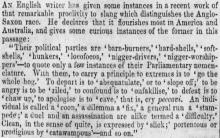A CHAPTER ON SLANG.
AN English writer has given some instances in a recent work of that remarkable proclivity to slang which distinguishes the Anglo-Saxon race. He declares that it flourishes most in America and Australia, and gives some curious instances of the former in this passage:
"Their political parties are 'barn-burners,' 'hard-shells,' 'soft shells,' 'hunkers,' 'locofocos,' 'nigger-drivers,' 'nigger-worshippers' -- to quote only a few instances of their Parliamentary nomenclature. With them, to carry a principle to extremes is to 'go the whole hog.' To depart is to 'absquatulate,' or to 'slope off;' to be angry is to be 'riled,' to confound is to 'onfakilise,' to defeat is to 'chaw up,' to apologize is to 'cave,' that is, cry peccavi. An individual is called a 'coon,' a dilemma a 'fix,' a general run a 'stampede;' a duel and an assassination are alike termed a 'difficulty.' Clean in the sense of quite, is expressed by 'slick;' portentous or prodigious by 'catawampous' --and so on."
We need hardly point out to the intelligent reader how incomplete the list is --he has altogether omitted Mr. Willis's compounds, such as "avenoodledom," "alabaster shelf" for bosom, "means of getting over the ground" for legs, "them asses" for the masses. The musical critic for the Daily Times has also the honor of introducing "rendition" into musical science --while the Napoleon of the Press has immortalised the higher orders of our republic as the "codfish aristocracy." "Upper Tendom" is the gigantic contribution of Greeley to the new language --but our space compels us to "simmer down," which elegant phrase is supposed to emanate from the theological jaws of the Rev. H. W. Beecher. We therefore introduce our readers to Australian idioms:
"There are in Sydney 500 public-houses, vast and resplendent as the London temples of spirits-worship. So the liquor interest is large; and it has created a language of its own. Therein, to pay for another person's drink is to 'stand,' to 'shout,' to 'sacrifice.' A measure of a certain capacity is denominated a 'nobbler' or a 'break-down.' In this dialect, ginger-beer and brandy mixed are named a 'stone fence;' lemonade and brandy a 'spider;' brandy; bitters and sugar a 'cocktail;' ice, brandy and water a 'smash;' brandy, sugar and peppermint a 'julep;' claret, sugar and orange a 'Catharine Hayes;' port, sugar and nutmeg a 'Madame Bishop' (this is irreverent, and betrays the spirit of dissent); old Tom, ginger, lemon and hot water --gin punch, in fact, plus ginger --a 'Lola Montes;' half a glass of sherry is a 'sensation,' a glass of gin and bitters a 'constitutional,' peppermint or cloves a 'maiden," and lemon-syrup a 'band of hope.' Food has also its slang vocabulary; bread and cheese being known by the equivalents 'roll and rind,' and salad being, by a profane and not pleasantly suggestive figure of speech, personified under the name of 'Nebuchadnezzar.'
"On taking a broader view of society, we shall find that the use of slang is not confined to thieves and ruffians. Read the Court Circular and fashionable intelligence of the journals which circulate among our aristocracy. There you will find an evening assembly called a soirée; a tea-party attended with dancing, a thé dansant; a meat breakfast, a déjeunér à la fourchette. In an account of a grand dinner, the victuals is described by similar slang, that is to say French slang, phrases; cutlets named à la Maintenon, or à la Soubise, which is just the same slang as a 'Madame Bishop' or a 'Catharine Hayes;' toad-in-the hole called vol-au-vent; this dish à la jardiniére, that à la financiére, and the like; phrases equally slang with 'jemmy' used as synonymous with sheep's head, or 'trimmings' as signifying the vegetables which ordinarily accompany a leg of mutton. Nor is a special slang distinctive of merely frivolous gentility. Take not only the world of fashion, but also the serious community. That, too, has a slang of its own. Its straight-haired melancholy and maudlin members call every trifling calamity which befalls them a 'trial.' Instead of devout they say 'prayerful;' for attending a minister's chapel, 'sitting under him.' The chapel itself they sometimes speak of as their 'Ebenezer.' They term an advantage a 'privilege;' a fit of fanaticism an 'experience;' and for an exposure of hypocritical rascality which plainspoken people would pronounce disgusting, the word in the sanctified slang-dictionaries is 'painful.'"
"A Chapter on Slang," New York (NY) Frank Leslie's Weekly, April 2, 1859, p. 1.

